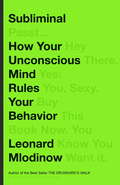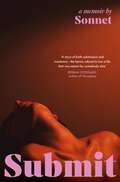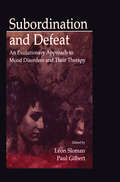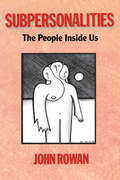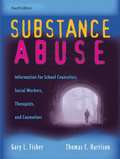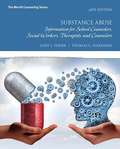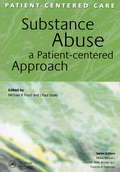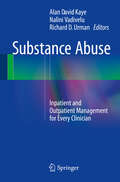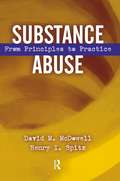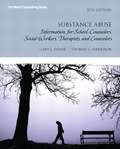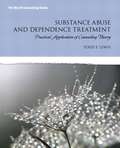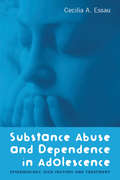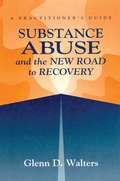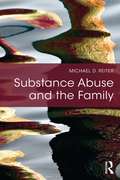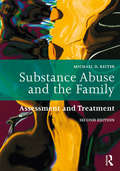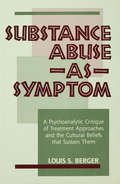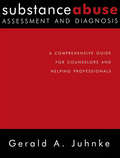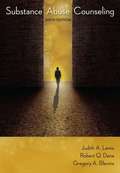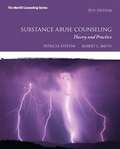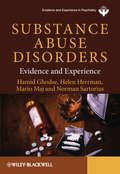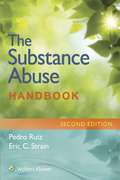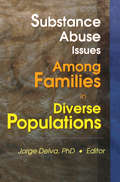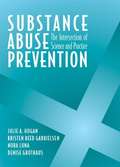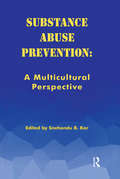- Table View
- List View
Subliminal: How Your Unconscious Mind Rules Your Behavior
by Leonard MlodinowLeonard Mlodinow, the best-selling author of The Drunkard's Walk and coauthor of The Grand Design (with Stephen Hawking), gives us a startling and eye-opening examination of how the unconscious mind shapes our experience of the world and how, for instance, we often misperceive our relationships with family, friends, and business associates, misunderstand the reasons for our investment decisions, and misremember important events.Your preference in politicians, the amount you tip your waiter--all judgments and perceptions reflect the workings of our mind on two levels: the conscious, of which we are aware, and the unconscious, which is hidden from us. The latter has long been the subject of speculation, but over the past two decades researchers have developed remarkable new tools for probing the hidden, or subliminal, workings of the mind. The result of this explosion of research is a new science of the unconscious and a sea change in our understanding of how the subliminal mind affects the way we live.Employing his trademark wit and lucid, accessible explanations of the most obscure scientific subjects, Leonard Mlodinow takes us on a tour of this research, unraveling the complexities of the subliminal self and increasing our understanding of how the human mind works and how we interact with friends, strangers, spouses, and coworkers. In the process he changes our view of ourselves and the world around us.
Submit
by SonnetThe shocking and illuminating memoir of an anonymous submissive immersed in the BDSM community, reckoning with the divide between our desires and the expectations and strictures that keep us from pursuing them. Sonnet is a writer. She is a professional with a wide network of important people. She is athletic, creative and successful. She always remembers to send Christmas cards. Sonnet also likes to be caned. She likes to be humiliated. She likes to go into a room blindfolded with ten strangers and have them do whatever they want to her. Sonnet likes whatever you tell her she likes. This is the secret memoir of a submissive. A vivid, electric, stunning account of how one woman gets her kicks. It is all true. This is an experience that can&’t be missed, all we ask is that you SUBMIT…
Subordination and Defeat: An Evolutionary Approach To Mood Disorders and Their Therapy
by Leon Sloman Paul GilbertMost people now accept that human beings are the product of millions of years of mammalian evolution and, more recently, primate evolution. This landmark book explores the implications of our evolutionary history for theories and therapies of depression. In particular, the focus is on how social conflict has shaped various behavioral and psychophysiological systems. Special attention is given to the evolved mechanisms for dealing with social defeat and subordination in both animals and humans. By linking human depression to the activation of ancient psychobiological programs for dealing with social conflict, one is able to understand the function of depression within groups, family systems, and between individuals and begin to distinguish depressions that may have adaptive functions from those that are the result of maladaptive feedback systems. Although many acknowledge the need for an integrated, biopsychosocial theory of psychopathology, there continue to be great divisions among social, psychological, and biological approaches. Sloman and Gilbert have brought together leading scientists and clinicians representing different disciplines and schools to present a provocative new evolutionary model of depression. This model illuminates old problems in new ways, links a common disabling condition to evolved mental mechanisms, and points to potential new approaches to prevention and intervention. The book will be of compelling interest to all those who study or treat mood disorders.
Subpersonalities: The People Inside Us
by John RowanWe all have had the experience of being divided, of being in two minds' about something - one part of us wants to do this, another wants to do that. Subpersonalities is the first book to do justice to the phenomenon as a normal feature of our psychological life. John Rowan argues that we all have a number of personalities that express themselves in different situations and that by recognising them we can come to understand ourselves better and improve our relationships with others. Anyone reading this book will run the risk of making quite new discoveries about themselves. In looking at where subpersonalities come from, John Rowan explores the work of psychologists and psychotherapists, from Jung and Freud onwards, and adds insights gained from his own work as a therapist and counsellor. He relates the journey of discovery that he himself undertook in search of his own subpersonalities. The result is a fascinating book that challenges our accepted view of ourselves and provides an intriguing picture of how human beings work and why communication between them so often goes wrong. Subpersonalties is a book for anyone interested in their own personality and how it helps or hinders their everyday life.
Substance Abuse: Information for School Counselors, Social Workers, Therapists, and Counselors (4th edition)
by Gary L. Fisher Thomas C. HarrisonWeaving actual clinical examples with solid research, Substance Abuse continues to provide counseling, social work, and other students with a detailed overview of the alcohol and other drug (AOD) field. Now in its Third Edition, this text provides updated coverage and practical clinical examples to reflect the rapid changes in the field of addiction. In a reader-friendly style, the authors present balanced coverage of various treatment models as well as objective discussions of the controversies in the field. The text covers topics spanning the entire field--pharmacology, assessment and diagnosis, treatment, recovery, prevention, children, families, and other addictions--providing students with a broad view of the AOD field as well as the pervasiveness of the problem in all areas of behavioral health and general fields.
Substance Abuse: Information for School Counselors, Social Workers, Therapists, and Counselors (Sixth Edition)
by Gary L. Fisher Thomas C. Harrison<p>In an accessible writing style, Fisher and Harrison’s Substance Abuse: Information for School Counselors, Social Workers, Therapists and Counselors presents succinct, practical coverage of alcohol and other drug prevention, treatment, and recovery for generalist students, prospective mental health professionals, and allied professionals. It includes basic information on substances of abuse and focuses on clinically relevant knowledge on such topics as cultural competence, co-occurring disorders, other behavioral addictions, children and families, and ethics and confidentiality. <p>Each chapter includes clinical application cases and questions for further discussion. The new edition inclues a new chapter on “Co-Occurring Disorders and Other Special Populations,” new information on cultural competencies and intervening with special populations such as the elderly and LGBTQQI, and new information on risk factors for alcohol and other drugs for culturally and ethnically diverse populations. </p>
Substance Abuse: A Patient-Centered Approach
by Michael Floyd J Paul SealeSeries Editors: Moira Stewart, Judith Belle Brown and Thomas R Freeman Primary care clinicians are often unfamiliar with new and effective methods for detecting substance abuse problems in their earliest stages, and the majority of patients with substance abuse problems remain undiagnosed. Substance Abuse is written by primary care clinicians and focused to meet the needs of primary care providers, demonstrating how the patient-centered clinical method can assist clinicians in learning how to diagnose this complex psychosocial disorder. This book describes how to use state-of-the-art screening techniques, and how to understand and motivate patients to decrease or eliminate harmful use of alcohol and drugs. It presents the latest scientific findings and gives examples of using a patient-centered approach, as well as describing specific communication skills, with samples of dialogue illustrating their use in helping substance-abusing patients. This is essential reading for all family doctors, paediatricians, gynaecologists, psychiatrists, nurses, social workers, psychologists and all clinicians whose practices include substance abusing patients. It will also appeal to counsellors, education personnel and all professionals working with substance abusing individuals.
Substance Abuse
by Alan David Kaye Nalini Vadivelu Richard D. UrmanThis book is written for any clinician who encounters substance abuse in a patient and wonders what to do. Experts from a cross-section of specialties and health professions provide up-to-date, evidence-based guidance on how non-expert clinicians can recognize, understand, and approach the management of substance abuse in their patients. They detail the range of treatments available and whether and how they work. The central importance of using a carefully selected multimodal approach that is tailored to the individual patient is emphasized throughout and illustrated in case scenarios from actual clinical practice.
Substance Abuse: From Princeples to Practice
by Henry I. Spitz David McDowellDesigned as a 'one-stop shopping' tool for anyone interested in or affected by substance abuse, this book provides detailed discussions that include the history, chemistry, biology, epidemiology, and salient characteristics of the most important and prevalent abused substances.
Substance Abuse: Information for School Counselors, Social Workers, Therapists, and Counselors,
by Thomas C. Harrison; Gary L. FisherIt combines the accessible writing style and succinct, practical topical coverage that have made it a market-leading resource for generalist students, prospective mental health professionals, and allied professionals.
Substance Abuse and Addiction Treatment: Practical Application of Counseling Theory
by Todd F. LewisSubstance Abuse and Addiction Treatment shows how to help clients struggling with addiction by looking through the lens of counseling theory. After tackling basic concepts of substance abuse and dependence counseling, it looks at different counseling theories and how each supports the client with substance abuse issues. Offering more how-to's than most books, the author provides concrete descriptions of counseling theory in action, so readers know how to intervene during a real counseling session. A consistent case study is used throughout the entire book to illustrate different treatment approaches and techniques.
Substance Abuse and Dependence in Adolescence: Epidemiology, Risk Factors and Treatment
by Cecilia A. EssauRecent years have seen a growth in the numbers of studies of substance abuse and dependence in adolescence, focusing on prevalence, risk factors, comorbidity, course and outcome. At the same time, numerous prevention and intervention strategies have been developed. Substance Abuse and Dependence in Adolescence presents a comprehensive review of state-of-the-art empirical and practical information on this topic.Cecilia A. Essau, along with an eminent group of international researchers and clinicians, summarises the most recent empirical findings and state-of-the-art knowledge on substance abuse and dependence in adolescence and includes comprehensive information on prevention and treatment. Substance Abuse and Dependence in Adolescence contains:* general issues related to substance use disorders* epidemiology, comorbidity, course, outcome and risk factors* the prevention and intervention of substance abuse and dependence* a discussion of progress and unresolved issues in substance use disorders* recommendations for future studies in the field.Substance Abuse and Dependence in Adolescence will be an invaluable resource for students, researchers, and other professionals working in the fields of psychology, psychiatry, paediatrics, social work and other mental health professions.
Substance Abuse And The New Road To Recovery: A Practitioner's Guide
by Glenn D. WaltersFirst published in 1996. Routledge is an imprint of Taylor & Francis, an informa company.
Substance Abuse and the Family
by Michael D. ReiterSubstance Abuse and the Family demonstrates what it means to view addiction through a systems lens by considering biology and genetics, family relationships, and larger systems. Throughout the text, Michael D. Reiter shows how to examine a person's predilection to become addicted, his or her social environment around substance use, the functionality of his or her family, and various treatment options. Chapters are organized around two sections: Assessment and Treatment. The first section pays attention to how the family system organizes around substance use and abuse. Here family roles, culture, and other issues such as family violence and resilience are covered. Two chapters are also included on the neuroscience and genetics of addiction, with contributions from Jaime L. Tartar and Christina Gobin. There are also chapters on working with partial systems, using genograms, and working in a culturally-sensitive way (with contributions from Dalis Arismendi), with culture-specific consideration paid to African American, Hispanic and Latin American, Asian American, and Native American families. The second half of the book explores what a systems orientation means in practice and goes over self-help groups for individuals and families. An overview of the major family therapy theories is included, which examines intergenerational, experiential, communication approaches, strategic, systemic, and post-modern models. A separate chapter examines issues faced by both youth and adult children of alcoholics. Intended for undergraduate and graduate students, as well as beginning practitioners, this text is one of the most penetrating and in-depth examinations on the topic available. .
Substance Abuse and the Family: Assessment and Treatment
by Michael D. ReiterIn this updated edition of Substance Abuse and the Family, Michael D. Reiter examines addiction through a family systems lens which considers a range of interconnected contexts, such as biology and genetics, family relationships, and larger systems. Chapters are organized around two sections: Assessment and Treatment. Examining how the family system organizes around substance use and abuse, the first section includes contributions on the neurobiology and genetics of addiction, as well as chapters on family diversity, issues in substance-using families, and working in a culturally sensitive way. The second half of the book explores various treatment options for individuals and families presenting with substance abuse issues, providing an overview of the major family therapy theories, and chapters on self-help groups and the process of family recovery. The second edition has many useful additions including a revision of the family diversity chapter to consider sexual and gender minorities, brand new chapters on behavioral addictions such as sex and gambling, and a chapter on ethical implications in substance abuse work with families. Additional sections include information on Multisystemic Therapy, Behavioral Couples Therapy, Motivational Interviewing, and Twelve-Step Facilitation. Each chapter now contains a case application to help demonstrate treatment strategies in practice. Intended for undergraduate and graduate students, as well as beginning practitioners, Substance Abuse and the Family, 2nd Ed. remains one of the most penetrating and in-depth examinations on the topic available.
Substance Abuse as Symptom: A Psychoanalytic Critique of Treatment Approaches and the Cultural Beliefs That Sustain Them
by Louis S. BergerWhat can psychoanalysis contribute to an understanding of the etiology, treatment, and prevention of substance abuse? Here, Louis Berger contests both the orthodox view of substance abuse as a "disease" explicable within the medical model, and the fashionable dissenting view that substance abuse is a habit controllable through the "willpower" fostered by superficial treatment approaches. According to Berger, substance abuse is first and foremost a symptom. He argues that it is only by grasping this fact that we can understand why standard approaches to treatment and prevention have failed. Berger invokes a wide spectrum of recent analytic insights about infant and child development, the psychology of narcissism, and primitive character disorders in making the case that substance abuse masks serious preoedipal (or "midrange") psychopathology. Such psychopathology, operating at both cultural and person levels, explains why certain individuals become dependent on illicit drugs; it is equally revelatory of why the substance abuse "establishment" -- and society at large -- continues to misconstrue the nature of the problem and to proffer ill-conceived and ineffective remedies. After thoroughly examining the motives, conscious and unconscious, that maintain "mainstream" myths about substance abuse, Berger points the way to alternative approaches to prevention and treatment.
Substance Abuse Assessment and Diagnosis: A Comprehensive Guide for Counselors and Helping Professionals
by Gerald A. JuhnkeSubstance abuse counseling has gone beyond being viewed as optional training; instead it is fast becoming an essential part of the education of helping professionals. In this book, Dr. Gerald Juhnke presents an innovative, practical model to be used in the assessment and diagnosing of substance abuse and related co-morbid disorders.Substance Abuse Assessment and Diagnosis includes practical "nuts and bolts" direction on how to facilitate a thorough, multi-tiered substance abuse assessment. This book uniquely incorporates detailed examples of how to use individual and significant other clinical interviews, including the CAGE, SUBSTANCE -Q, etc, standardized specialty instruments, drug detection types, and personality instruments to accomplish this feat. This is the only book of its kind that provides practical detail on how to use and score these varied assessment instruments-including the newest "cornerstone instruments," the MMPI-2, the SASSI-3 and the recently released SASSI-A2.Students and practitioners alike will benefit from this comprehensive volume on the assessment and diagnosis of substance abuse.
Substance Abuse Counseling
by Judith A. Lewis Robert Q. Dana Gregory A. BlevinsSUBSTANCE ABUSE COUNSELING, 6th Edition, is at the cutting edge of the addiction field, combining a focus on the most current empirical studies with a firm belief that clients must be treated with a collaborative and respectful approach. These core values lay the basis for individualized treatment planning, attention to the client's social environment, a multicultural perspective and a recognition that client advocacy is part of the counselor's role. Effective and current best practices are discussed throughout the text, and learning objectives and key terms help students focus on areas of most importance.
Substance Abuse Counseling (Fourth Edition)
by Judith A. Lewis Robert Q. Dana Gregory A. BlevinsProviding an overview of substance abuse counseling, this volume emphasizes the need to treat clients from an individualized perspective, based on his or her particular behaviors, culture, gender, and mental health. Both the process of behavior change and the context in which it occurs are described in chapters on assessment and treatment planning, group work, working with families, preventing substance abuse, and the effects of drugs. Case studies illustrate the principles outlined and their practical applications. Appendixes include case history forms, initial behavior assessments, a comprehensive drinker profile, the Michigan Alcoholism Screening Test, a questionnaire on drinking and drug abuse, a family drinking survey, and lists of Web sites, treatment manuals, and self-help resources.
Substance Abuse Disorders
by Hamid Ghodse Mario Maj Helen Herrman Norman SartoriusSubstance abuse disorders are among the most prevalent psychiatric disorders and are frequently comorbid with other psychiatric and health conditions and accompanied by social problems; however, they remain under-recognized and under-treated. Many physicians and mental health practitioners receive little-to-no training in the identification and treatment of these disorders. Approaches to their prevention include some of the major success stories in modern public health as well as some of the deepest controversies in public life. This new title in the WPA series Evidence and Experience in Psychiatry informs psychiatrists and a wide range of professional groups from health and social services about these disorders and their treatment and control. 'Highly Commended' in the Psychiatry section of the 2012 BMA Book Awards
The Substance Abuse Handbook
by Pedro Ruiz; Eric C. StrainStay up to date with the latest substance abuse treatments and modes of intervention with The Substance Abuse Handbook, 2e. The editors are both nationally recognized clinicians, and provide authoritative, clinically oriented information on the subject of substance use, abuse, and dependence, with an emphasis on diagnosis, treatment, and prevention.
Substance Abuse Issues Among Families in Diverse Populations
by Jorge DelvaEnrich your knowledge of substance abuse treatment solutions used in diverse cultures within the United States!This informative volume highlights ways in which substance abuse problems are experienced and addressed by families in diverse populations at the societal, familial, and individual levels. Its scope is broad, providing you with information about the experiences and, in some cases, healing of diverse groups of people in the United States. These include African-American and Latino families, Hawaiian elders, Asian/Pacific Islanders of various sexual persuasions, Al-Anon members, and welfare recipients.What's good for the goose is not necessarily good for the gander. What works for one social/cultural group may not be at all helpful for another. Substance Abuse Issues Among Families in Diverse Populations will inform and enlighten you about the ways that people from various backgrounds respond to treatment and about the culture-specific treatments and interventions that work for them. This unique book examines: mandatory drug testing of welfare recipients, or ”conditional welfare” kinship support in the cultural context of Latino and African-American families how Hawaiian elders contribute in the treatment of Asian and Pacific Islander women for substance abuse, and the time-honored Hawaiian family intervention strategy ”Hooponopono” the results of a study focused on the types and extent of social support that Asian and Pacific Islander males received from their parents after revealing that they were both gay and HIV-positive the results of interviews with Al-Anon members about their experiences in watching their spouses slip into alcoholism the relationship between family involvement and the effectiveness of substance abuse treatment programsSocial workers, counselors, psychologists, those involved in ethnic studies, and anyone interested in diversity issues in general or substance abuse in particular will find Substance Abuse Issues Among Families in Diverse Populations of great value.
Substance Abuse Prevention: The Intersection Of Science And Practice
by Julie Hogan Kristen Gabrielsen Denise Grothaus Nora LunaThis text teaches students about the science-based components of substance abuse prevention practice. This cutting-edge book responds to the growing need for a textbook that addresses the rapid development of the substance abuse prevention profession. Finally, professors have a text that supports the content of their prevention courses! Substance Abuse Prevention presents the most current knowledge in the field, analyzing what does and doesn't work in the implementation of prevention programs. The text also prepares students for the successful completion of the ICRC examination.
Substance Abuse Prevention: A Multicultural Perspective
by Snehendu B. KarIn thirteen chapters, twenty-four authors share their analyses, concerns, and conclusions in several domains including the: meaning and dynamics of multiculturalism affecting prevention intervention, relative risks and knowledge gaps across ethnic groups, social trends affecting health risks and substance abuse, lessons learned from substance abuse research and prevention, role of the media, promises and limits of the new public health paradigm for assessment, policy development, assurance of preventive services, and social action and empowerment for prevention in partnership with the public.
